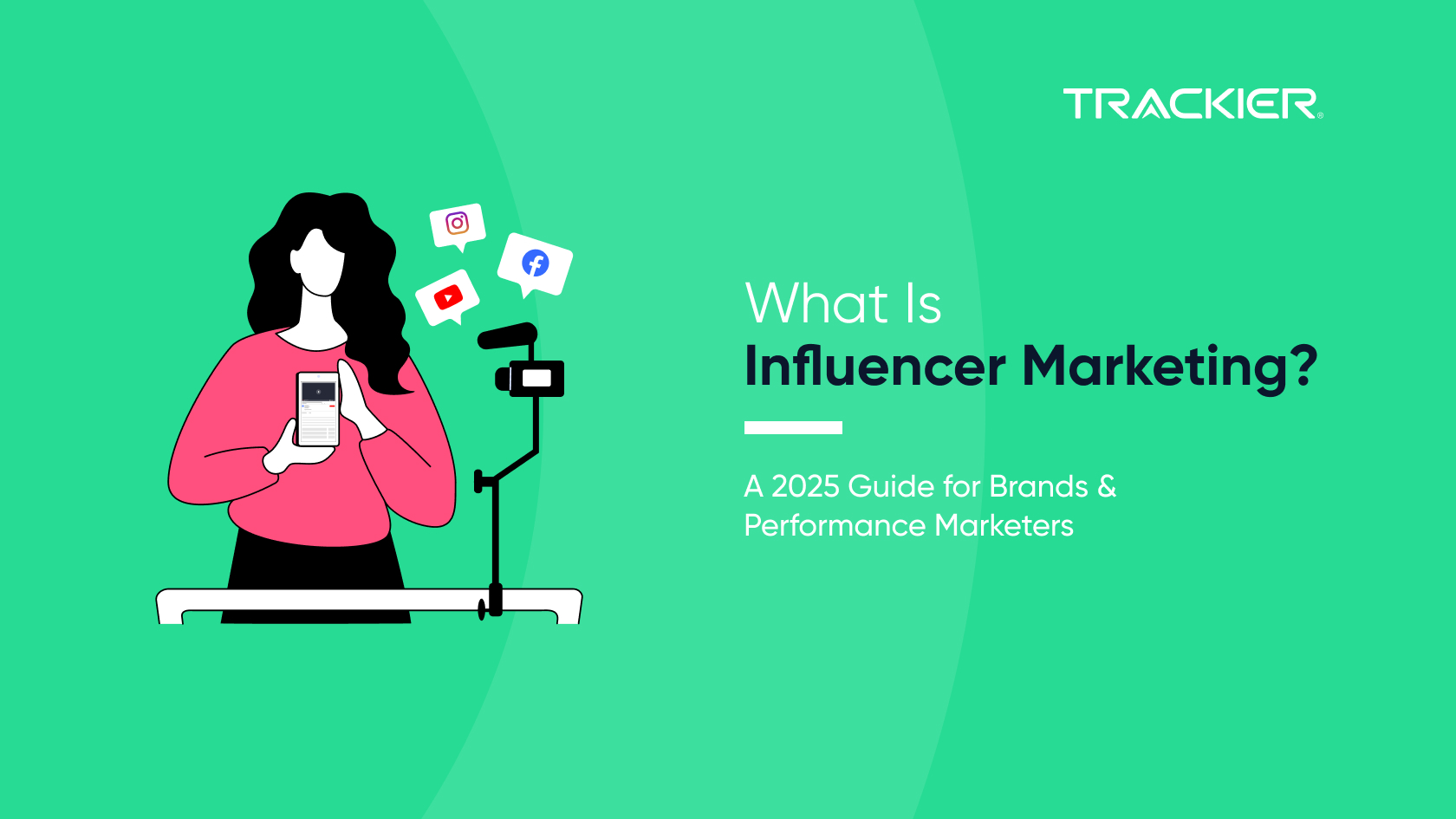In today’s digital-first economy, consumers have seen so many brands’ messages (through advertisements), and startups have to spend a huge marketing budget to stand out. That’s where influencer marketing for startups is a trust-driven strategy that helps startups avoid the traditional way of advertising and directly connect with their audiences.
In fact, 89% of marketers will increase or at least maintain their investments in influencer marketing for 2025. And the reason? Because it gives measurable and cost-effective results.
Other than this, influencer marketing helps startups to create brand awareness, build credibility, and drive conversions. And you can use a performance marketing software like Trackier to manage your influencer campaigns, set automation, identify fraud activities, and get data-driven insights.
Why Startups Should Prioritize Influencer Marketing?
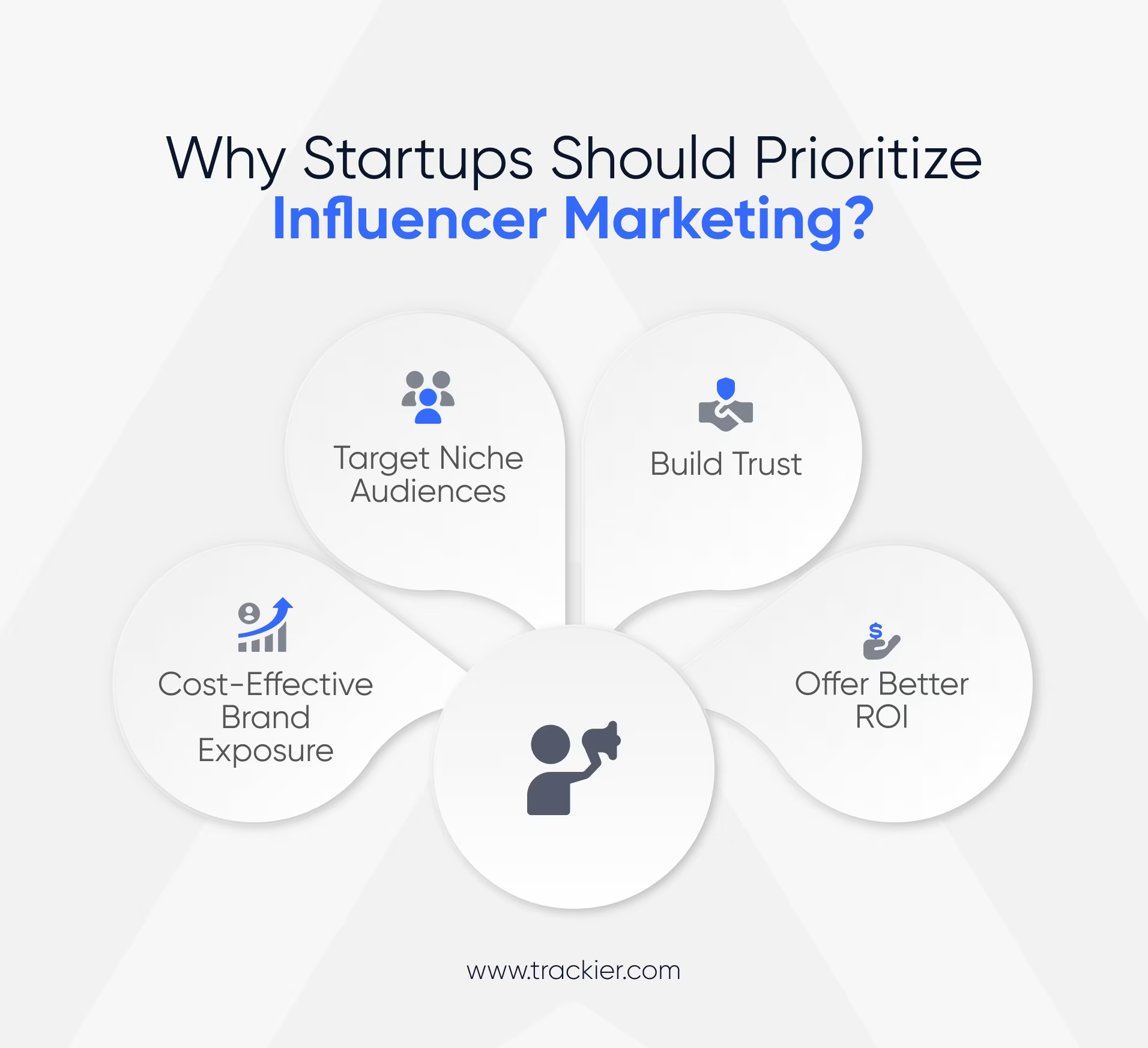
Startups need to adapt to changes at a rapid rate as they have limited time, capital, and less brand awareness. They are continuously looking for marketing channels that can deliver immediate results along with building brand awareness.
Influencer marketing fulfills all of these criteria by providing cost-effective ways to create hype, build trust, and drive measurable results from day one.
- Cost-Effective Brand Exposure: Old traditional ways of advertising methods (whether it’s Google Ads or media buys) can be costly, specifically for new-age startups that are still evaluating the market. Influencer marketing helps brands reach many potential customers with an affordable marketing budget.
- Target Niche Audiences: The first move of every startup is to target specific market segments or solve a niche problem for a specific audience. With the help of influencers, brands can directly reach their target audience.
- Build Trust: Without building trust, it will be very difficult for startups to grow significantly. They have to collaborate with influencers to increase their brand trust.
- Offer Better ROI: If executed correctly, influencer marketing provides better ROI than any traditional way of advertising. This is even more important when it comes to performance-based models, where influencers only get paid when they generate a sale.
Types of Influencer Marketing That Work For Startups
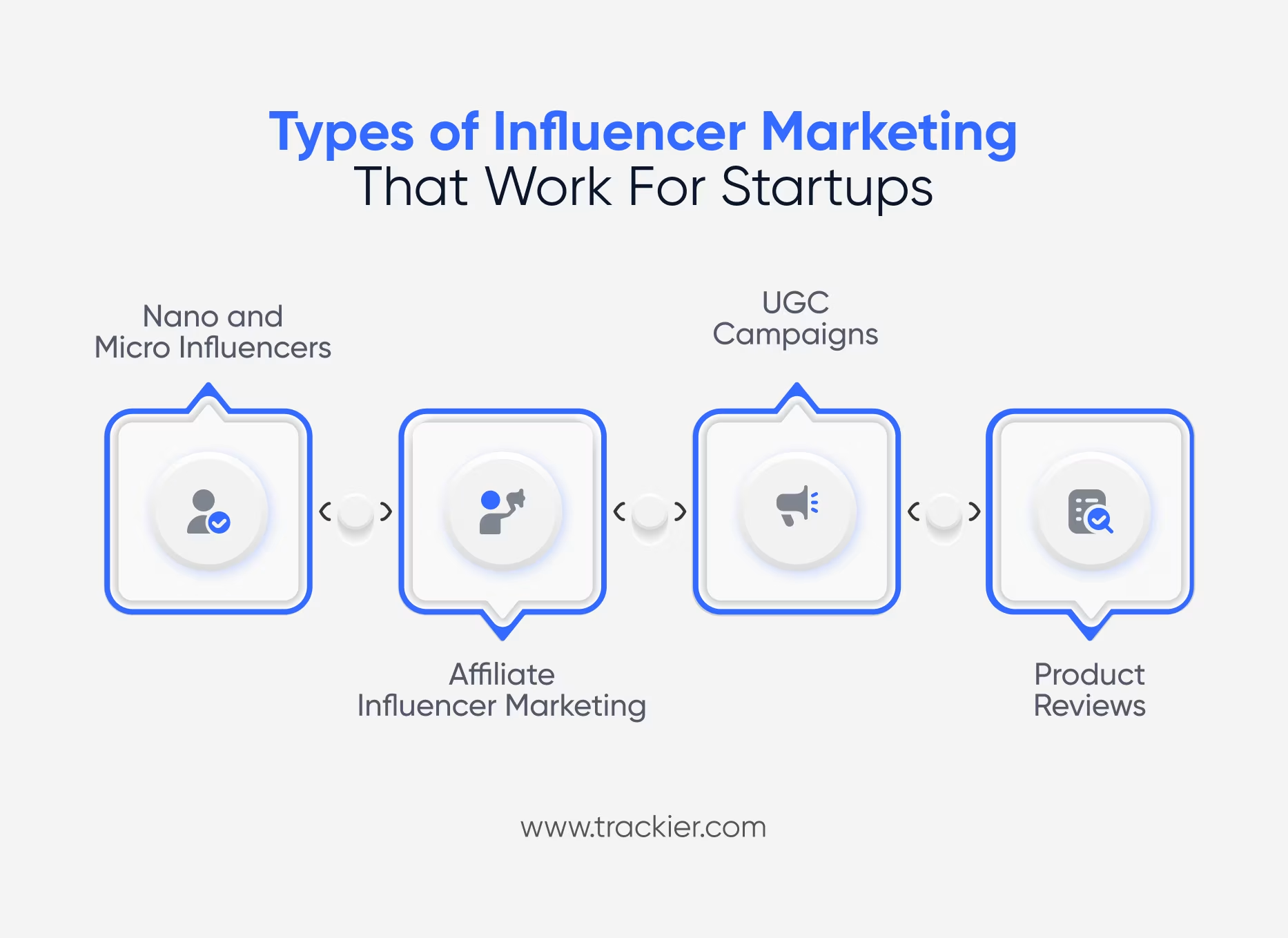
Not every influencer marketing campaign will be the perfect one. As a startup, you have to try every strategy. These four types of influencer marketing for startups are among the most effective in delivering results.
1. Nano and Micro Influencers
Nano influencer (who has 1K–10K followers) and micro influencers (who have 10K–100K followers) have a limited set of audiences, but they are more engaged. Startups can collaborate with these influencers at an affordable cost that gives maximum impact and reach.
2. Affiliate Influencer Marketing
This is the performance-based model where startups have to only pay their influencers when they bring conversions (it could be sales, signups). Brands can use a performance marketing software to manage their affiliate influencer campaigns, get comprehensive reporting, and receive real-time updates.
3. UGC Campaigns
Encourage influencers and customers to create their experiences by using your product. This approach will help to build authority in your niche. You can also use these videos in your website copies and social media advertisements.
4. Product Reviews
Create a hype around your brand by sending free samples of your products to their influence and asking them to give genuine feedback on their social media accounts. This helps to get the maximum exposure.
How New Startups Can Use Influencer Marketing?
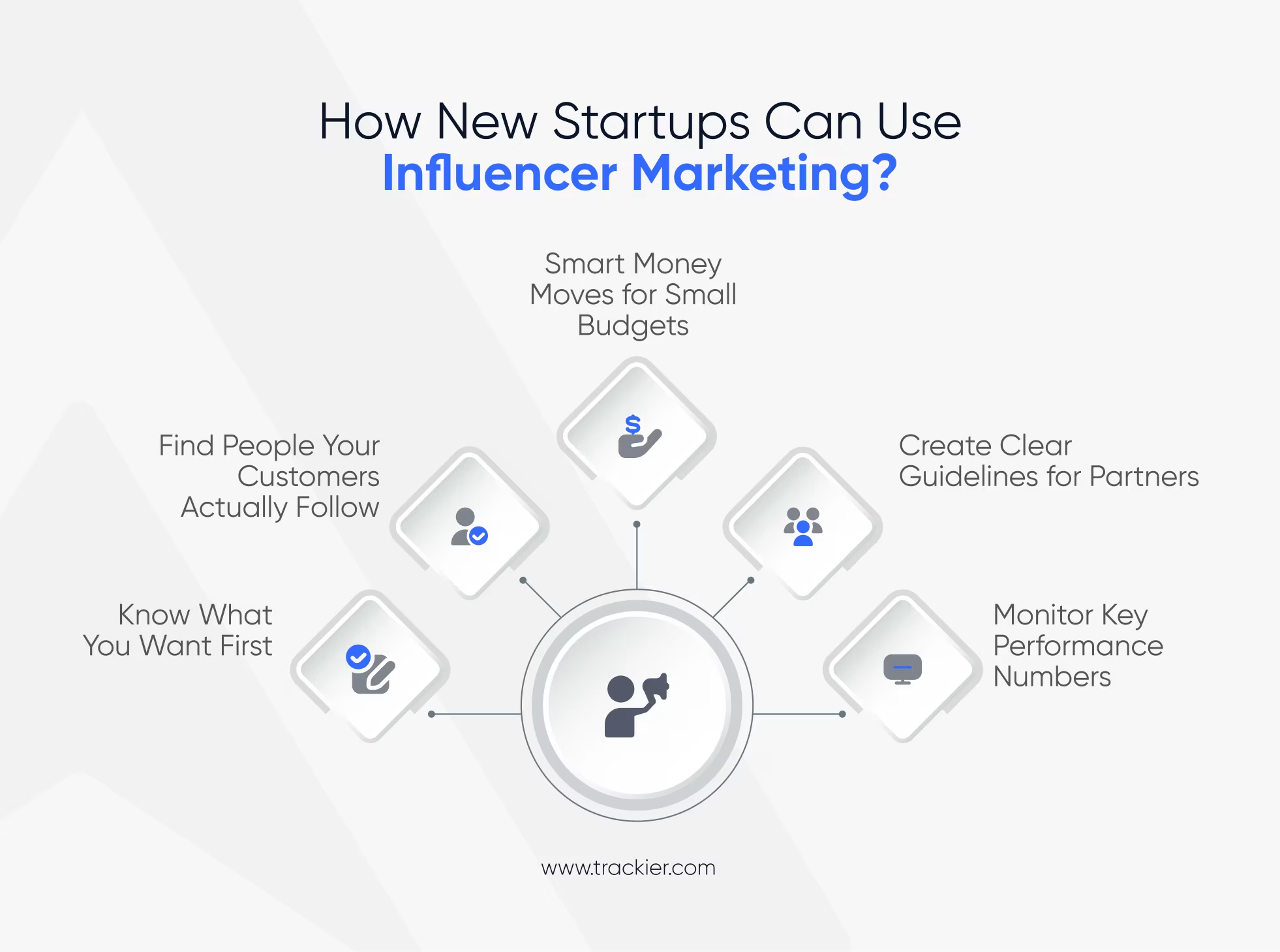
Most new startups think they need viral content to succeed. That’s not true. You need a real plan that brings actual customers. A well-planned influencer marketing strategy for startups focuses on setting clear goals and identifying the right creators.
1. Know What You Want First
Before you spend any money, ask yourself: what’s the point? Maybe you want people to hear about your brand for the first time. Or maybe you need paying customers right now.
Once you figure this out, everything else gets simpler. You’ll know which people to work with and what success looks like.
2. Find People Your Customers Actually Follow
Big follower numbers don’t mean much. Here’s what actually matters:
- Your ideal customer should be watching this person already. If you sell fitness gear, work with someone fitness people trust.
- Look at their posts. Do people comment real thoughts? Or just random emojis? Real conversations mean real influence.
- Ask them about other brands they’ve helped. Good influencers can show you actual results, not just pretty posts.
3. Smart Money Moves for Small Budgets
New startups can’t throw money around. Here are three ways to pay:
- Pay them once upfront – simple but risky if nothing happens.
- Pay them only when they bring you sales – safer for you, but harder to find people who’ll agree.
- Mix both – small payment upfront, bonus for results.
4. Create Clear Guidelines for Partners
Give your content creators detailed instructions that cover all the basics. Set clear goals for your campaign, whether you want more brand awareness or direct sales.
Share your messaging rules, the specific calls-to-action you need, approved hashtags, and when everything needs to be finished.
Let creators bring their own style to the work while making sure they match your company’s voice and values.
5. Monitor Key Performance Numbers
Smart businesses focus on the metrics that actually matter for return on investment. Pick an influencer who delivers measurable results by watching these core numbers:
- Sales conversion from their content
- How many people click your links?
- Audience interaction rates
- What does each new customer cost you to acquire?
Challenges For Startups in Influencer Marketing
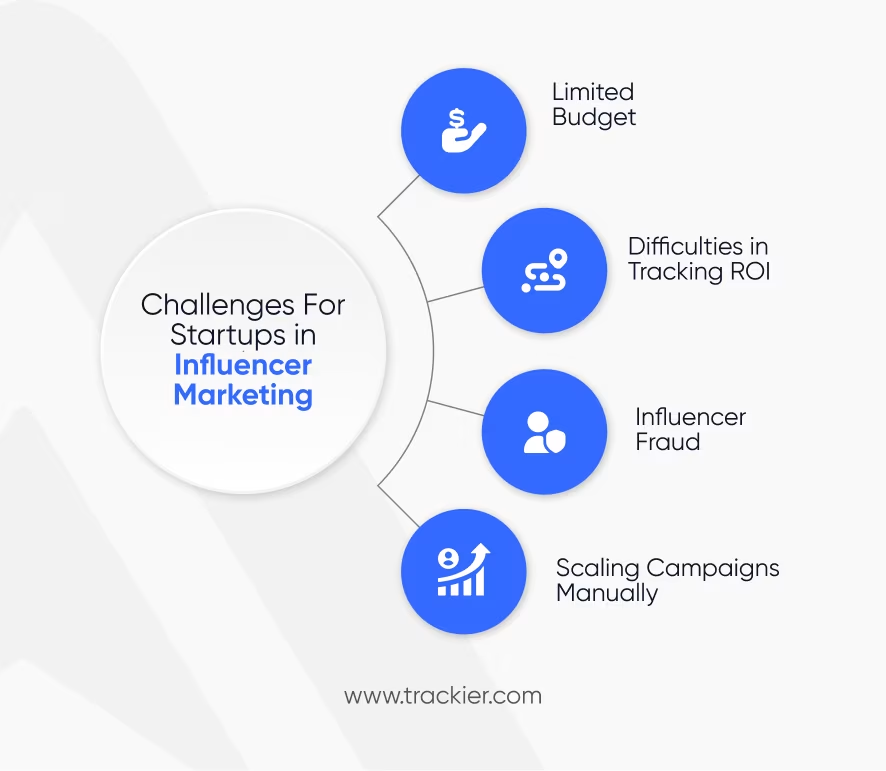
Startups often face many challenges while doing influencer marketing. Identifying and solving these could help you plan your campaign better. Some challenges are:
- Limited Budget: Startups have limited budgets; they should have proper tools that help them to stop overspending on the wrong influencer or campaigns without having any clear ROI.
- Difficulties in Tracking ROI: Many new-age startups face the struggle to measure their actual ROI for their influencer campaigns. Instead of tracking revenue, they often track likes and shares, which does not make any sense.
- Influencer Fraud: Some influencers often mislead with fake followers and inflated engagement rates. Startups could waste their marketing budget on these creators who can’t deliver real value
- Scaling Campaigns Manually: Doing all of the day-to-day tasks like connecting with multiple influencers, negotiating deals, tracking their performance, and processing payouts could reduce your precious time to get actual ROI from your team.
How Trackier Helps Startups to Grow?
Growing a new startup isn’t an easy job. Marketing budgets are tight, and every dollar counts. That’s where Trackier helps small startups with what they need to make smarter choices.
- Better Tracking That Actually Makes Sense: Most startups waste money because they can’t tell which ads work. Trackier fixes this problem. You get simple reports that show real numbers – how many people clicked, bought something, or just browsed around.
- Stop Wasting Money on Fake Traffic: Here’s a problem most founders don’t see coming – fake clicks that drain your budget. Bots and scammers can mess up your data and steal your ad spend. Trackier identifies these tricks before they impact your budget. You’ll know which partners are legit and which ones are just taking your money.
- Dashboard That Works For You: Startups benefit when they build reporting that tracks what actually matters to them. Maybe that’s profit margins. Maybe it’s which countries bring the best customers. The point is getting data that helps make decisions.
Bottom Line
The influencer game has changed. It’s not some trendy add-on to your marketing mix anymore. Startups that want to scale fast need it. Customers trust a brand more when real people recommend it. In a crowded market, this trust gives you an edge to compete with your competitors.
But here is the thing – picking influencers is just step one. Most startups mess up the execution. They don’t track properly. They don’t scale what’s working.
Spending marketing dollars without knowing your returns? That’s throwing money away. Tools like Trackier solve this problem. You get live data. You know which campaigns actually drive sales. You identify fake clicks and see everything in detailed reports.
FAQs
What are the benefits of influencer marketing for startups?
With the use of influencer marketing, startups can get many benefits, including increasing brand awareness, building trust, and improving engagement.
How to find influencers to promote your product?
Use different social media platforms and influencer marketing tools to find relevant influencers.
Does influencer marketing for startups work in India?
Yes, influencer marketing works in India for new-age startups.


